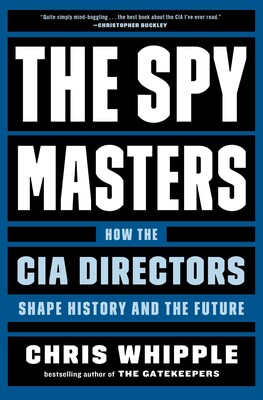We are excited to welcome Lindsay Chervinsky, a regular guest of Clay’s weekly podcast as an ongoing contributor to Listening to America. In her first installment she reviews The Spymasters by Chris Whipple.

Last year represented a sort of reading revolution for me. I’ve always been a voracious fiction reader because it’s the best way for me to check out and rest my brain. I also must read a lot of scholarship as part of my own work and research. But I found myself with lengthy lists of to-read nonfiction books that had no relation to my current book project and little time for them. Or rather, I should say that at the end of the day when work was done, I prioritized fiction over nonfiction. But I believe in reading, learning, supporting other writers, and staying abreast of new publications. So I finally starting listening to books on Audible.
Now before you roll your eyes at me or close this post, hear me out. I cannot listen to fiction on Audible. My mind wanders and I lose important plot points. I also cannot listen to nonfiction if it gets too close to my work because then I need to constantly pause the narrative to take notes. But, let’s say it’s a book on the Supreme Court during FDR’s presidency or a biography of Dwight D. Eisenhower, then Audible is perfect. All of which is to say that you just need to find what works for you! By picking up audiobooks while running errands, driving, completing chores, and exercising, I’ve been able to increase my nonfiction consumption in a big way.
Two of the books I most enjoyed listening to this year were by Chris Whipple: The Gatekeepers about White House chiefs of staff and The Spymasters about directors of the CIA. (Full disclosure: I presented at a conference with Chris, but he doesn’t know I’m writing this post). Mark Bramhall narrates both books and does a phenomenal job. He has a lovely voice and absolutely nails the dry wit and humor. He’s so good that I’ve picked my next reads based on his past catalog of work.

I knew a little bit more about chiefs of staff before reading The Gatekeepers, but I knew very little about CIA directors other than a bit about Allen Dulles (the first civilian director of Central Intelligence). I learned so much and I highly recommend Spymasters for anyone who wants to better understand the intelligence process and community and how it relates to politics and policy.
Whipple uses a combination of recently declassified sources and firsthand interviews, many of which include information that has never been previously publicly discussed. As a result, the book has a very fresh and human quality; you don’t feel any distance from the subjects. Here are three takeaways that have stuck with me in a big way.
1. Individuals Matter. So much of leadership is about the person in power. How do they work with others? What is their background and how do they bring that expertise to their current position? What are their strengths and weaknesses? That’s true in any organization, but especially in the CIA which has a very distinct internal culture.
Whipple does a marvelous job capturing the personalities of the CIA directors and exploring their interactions with their subordinates, the president, and Congress. He holds no punches, you really get a sense of what made these men tick, when they came up short, and where they excelled. One of the more interesting insights is that it is hard to predict based solely on resumes who will thrive in the job and who will fail. Instead, there are so many intangible qualities that must be considered when a president selects a new director.
2. The Highest of Stakes. Intelligence gathering, as I understand it, is rarely black and white. It depends on nuance, gut instinct, and the careful cultivation of questionable relationships. And yet, the outcome is quite stark: either the CIA and the other intelligence agencies get things right and we rarely learn about the successful thwarting of an attack, or they get it wrong, and things go badly. Or worse, they get it right, but the advice is ignored or not acted upon, and things go boom. Spymasters does a really good job of analyzing what it means to operate under those stakes.
3. Rethink Everything You Know. I lived through many of the events in the later chapters of the book. I remember September 11 vividly. I’ve been an avid consumer of news off and on for a while now, and I have a pretty darn good education. But goodness, did Whipple challenge my thinking about a lot of events in the last few decades. And I’m better for it. I feel better equipped to be an engaged citizen, to hold public officials accountable, and to consume the news more intelligently.
Spymasters is an excellent choice for anyone looking to better understand national security, foreign policy, and our national politics. It would be a great book for Father’s Day, but I’m a big believer that dad books don’t just belong to dads. Whipple’s writing is accessible and lively, so anyone with a smattering of interest in politics and history would be a good reader.
Looking forward to sharing more reads with you all in the coming months!
Lindsay M. Chervinsky, Ph.D. is a presidential historian and a regular guest on Listening to America. She is the author of several books including the forthcoming Making the Presidency: John Adams and the Precedents that Forged the Republic. She is on social media @lmchervinsky.
